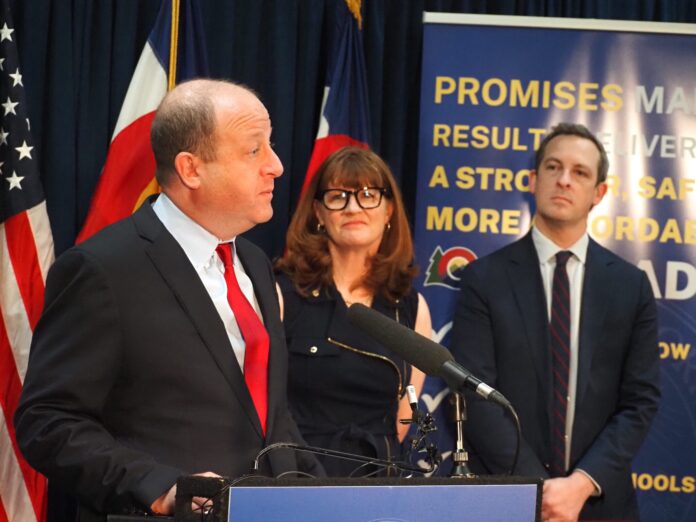
Colorado legislative leaders characterized the recently ended session as a “breakthrough” four months that laid crucial policy groundwork for transformation of the state’s housing, transportation and environmental situations.
“In my State of the State address to the Legislature this year, I laid out a vision for the future of the state — a vision where we have housing and people can afford to live near jobs and near transit, access to low-cost and convenient transit opportunities, a better environment with cleaner air and water and Colorado as one of the safest states in the country,” Democratic Gov. Jared Polis said at a post-session press conference on Thursday at the Capitol.
“We’ve gotten the pieces in place to help make sure this powerful vision for Colorado’s future is becoming a reality,” he said.
Polis, first elected in 2018, described it as the most significant legislative session while he has been governor.
Alongside Democratic leaders in the Legislature, Polis applauded victories from the session, primarily the suite of land use and housing policies ushered through by the Democratic majorities in both the House and Senate chambers.
That includes successful bills to encourage housing density by transit, allow accessory dwelling units by right in many parts of the state, eliminate parking minimums in some places and prohibit residential occupancy limit regulations. Those were all pieces last year of the failed massive land use legislation, brought back this year instead as individual bills.
The hope is that the policies will have visible consequences a few years down line in increasing attainable housing stock.
“This is not the type of thing where you sign the bill and the next week you have more buses and more housing. It takes the development cycle — which doesn’t mean forever, but it means it takes a few years,” Polis said. “It’s about changing the trajectory. It’s about a course correction for what we’ve been experiencing.”
Most of those housing bills were narrowed through amendments during the legislative process. They also focus heavily on the Front Range and other population centers and leave out rural and mountain areas.
Bipartisan deals
It was a dramatically different tone this year as legislators wrapped up work, compared to the frazzled and tense environment of 2023, which saw a planned walkout by House Republicans over a property tax plan and the death of that omnibus land use bill on the last day of session.
Instead, lawmakers of both parties in the Senate celebrated outgoing members with lengthy tributes, and those in the House danced, ate and watched comedic videos produced by their colleagues well before the midnight session deadline.
Leaders of both parties highlighted increased bipartisanship this session.
“I feel like after Proposition HH, the conversations changed and we were able to have some really good bipartisan conversations around the hard topics that we’re all talking about: affordability, housing, tax cuts, all of that,” said House Minority Rose Pugliese, a Colorado Springs Republican.

Proposition HH was an unsuccessful property tax relief measure that Democrats put on the ballot last year. After it failed, the Legislature came back for a special session to pass tax rate cuts and establish a bipartisan commission on the issue, which worked through the regular session. In the end, lawmakers passed a bipartisan property tax bill they hope will offer a permanent solution after years of one-time relief measures that Polis said had been “fraught with politics.”
“I’m grateful to all the folks that came together to work on this important issue. They were able to put their differences aside and their heads together and find a balanced approach to meet the moment. That’s how it should be done,” Senate President Steve Fenberg, a Boulder Democrat, said.
House Speaker Julie McCluskie, a Dillon Democrat, said it was “intentional, constant engagement” with Republican leaders that enabled the property tax consensus at the end.
There were also bipartisan deals on an income tax reduction scheme and wetland protections in the waning days of the session.
The threat of costly, contentious ballot measures this November informed some of the compromise deal bills at the tail end of session. Voters will still consider at least one property tax initiative, however.
“We as legislators, we seek to do our job well. And I would like to see us get ahead of that. I would like to see us be answering the questions of people and providing to them the relief that they’ve been clamoring for,” Senate Minority Leader Paul Lundeen, a Monument Republican, said.
House Republican caucus members said they will not be taking a position on either of two possible conservative property tax ballot initiatives.
“It’s important to understand that if we did nothing this year, nothing at all, and just waited to see if initiatives passed, it would be really, really hard for our citizens,” Rep. Lisa Frizell, a Castle Rock Republican who sponsored the property tax bill, said.
Aside from housing and property tax relief, leaders highlighted policy victories in education, transit investment and the environment on Thursday.
This story first appeared at Colorado Newsline. Colorado Newsline is part of States Newsroom, a national nonprofit news organization. Colorado Newsline is a nonprofit, nonpartisan, independent source of online news.

